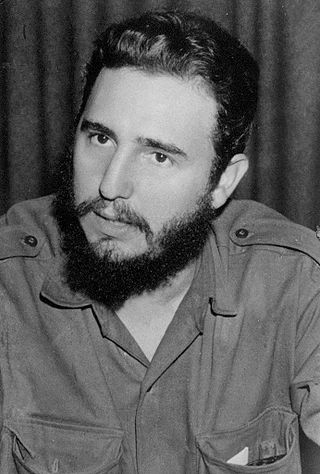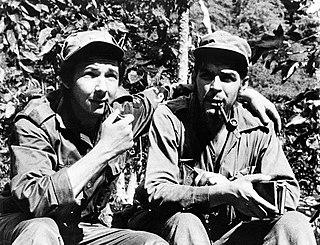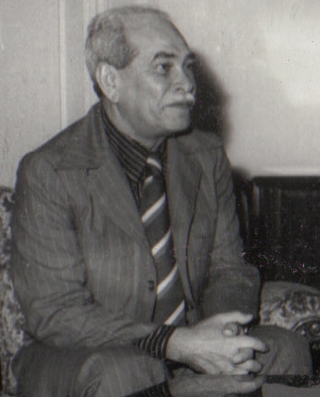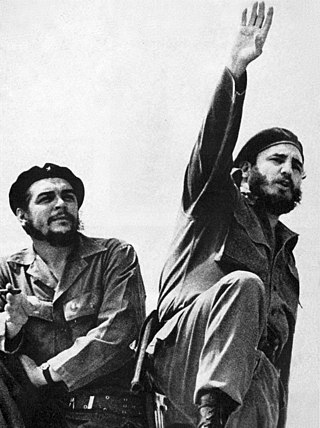
The Cuban Missile Crisis, also known as the October Crisis in Cuba, or the Caribbean Crisis, was a 13-day confrontation between the governments of the United States and the Soviet Union, when American deployments of nuclear missiles in Italy and Turkey were matched by Soviet deployments of nuclear missiles in Cuba. The crisis lasted from 16 to 28 October 1962. The confrontation is widely considered the closest the Cold War came to escalating into full-scale nuclear war.

Fidel Alejandro Castro Ruz was a Cuban revolutionary and politician who was the leader of Cuba from 1959 to 2008, serving as the prime minister of Cuba from 1959 to 1976 and president from 1976 to 2008. Ideologically a Marxist–Leninist and Cuban nationalist, he also served as the first secretary of the Communist Party of Cuba from 1965 until 2011. Under his administration, Cuba became a one-party communist state; industry and business were nationalized, and socialist reforms were implemented throughout society.

The 26 July Movement was a Cuban vanguard revolutionary organization and later a political party led by Fidel Castro. The movement's name commemorates the failed 1953 attack on the Moncada Barracks in Santiago de Cuba, part of an attempt to overthrow the dictator Fulgencio Batista.

After the establishment of diplomatic ties with the Soviet Union after the Cuban Revolution of 1959, Cuba became increasingly dependent on Soviet markets and military aid and was an ally of the Soviet Union during the Cold War. In 1972 Cuba joined the Council for Mutual Economic Assistance (Comecon), an economic organization of states designed to create co-operation among the communist planned economies, which was dominated by its largest economy, the Soviet Union. Moscow kept in regular contact with Havana and shared varying close relations until the end of the Soviet Union in 1991. Cuba then entered an era of serious economic hardship, the Special Period.

A guerrilla foco is a small cadre of revolutionaries operating in a nation's countryside. This guerrilla organization was popularized by Che Guevara in his book Guerrilla Warfare, which was based on his experiences in the Cuban Revolution. Guevara would go on to argue that a foco was politically necessary for the success of a socialist revolution. Originally Guevara theorized that a foco was only useful in overthrowing personalistic military dictatorships and not liberal democratic capitalism where a peaceful overthrow was believed possible. Years later, Guevara would revise his thesis and argue all nations in Latin America, including liberal democracies, could be overthrown by a guerrilla foco. Eventually the foco thesis would be that political conditions would not even need to be ripe for revolutions to be successful, since the sheer existence of a guerrilla foco would create ripe conditions by itself. Guevara's theory of foco, known as foquismo, was self-described as the application of Marxism-Leninism to Latin American conditions, and would later be further popularized by author Régis Debray. The proposed necessity of a guerrilla foco proved influential in Latin America, but was also heavily criticized by other socialists.
The Cuban Revolution was the overthrow of Fulgencio Batista's regime by the 26th of July Movement and the establishment of a new Cuban government led by Fidel Castro in 1959.

Blas Roca Calderio was a Cuban politician and Marxist theorist who served as President of the National Assembly of People's Power from 1976 to 1981. He was also general secretary of the pre-1959 revolution Communist Party of Cuba for 28 years and editor of the communist newspaper Hoy. He was a signatory of the 1940 Constitution of Cuba, and chaired the committee that wrote the country's first socialist constitution in 1976.

Fidelismo, otherwise known as Castroism, consists of the personal beliefs of Fidel Castro, which were often anti-imperialist, Cuban nationalist, supportive of Hispanidad, and later Marxist–Leninist. Castro described two historical figures as being particular influences on his political viewpoints: the Cuban anti-imperialist revolutionary José Martí, and the German sociologist and theorist Karl Marx. The thought of Che Guevara and Jules Régis Debray have also been important influences on Fidel Castro.

The Communist Party of Cuba is the sole ruling party of Cuba. It was founded on 3 October 1965 as the successor to the United Party of the Cuban Socialist Revolution, which was in turn made up of the 26th of July Movement and Popular Socialist Party that seized power in Cuba after the 1959 Cuban Revolution. The party governs Cuba as an authoritarian one-party state where dissidence and political opposition are prohibited and repressed. The Cuban constitution ascribes the role of the party to be the "leading force of society and of the state".
Alexander Ivanovich Alexeyev was a Soviet intelligence agent who posed first as a journalist and later a diplomat. His arrival in Havana on 1 October 1959 inaugurated a new era in Cuba–Soviet Union relations. Alexeyev was later appointed as the Soviet Ambassador to Cuba, and played a vital role in easing tensions during the Cuban Missile Crisis.
The political career of Fidel Castro saw Cuba undergo significant economic, political, and social changes. In the Cuban Revolution, Fidel Castro and an associated group of revolutionaries toppled the ruling government of Fulgencio Batista, forcing Batista out of power on 1 January 1959. Castro, who had already been an important figure in Cuban society, went on to serve as prime minister from 1959 to 1976. He was also the first secretary of the Communist Party of Cuba, the most senior position in the communist state, from 1961 to 2011. In 1976, Castro officially became president of the Council of State and president of the Council of Ministers. He retained the title until 2008, when the presidency was transferred to his brother, Raúl Castro, who was vice president. Fidel Castro remained the first secretary of the Communist Party until 2011.
The anti-Stalinist left encompasses various kinds of Marxist political movements that oppose Joseph Stalin, Stalinism, Neo-Stalinism and the system of governance that Stalin implemented as leader of the Soviet Union between 1924 and 1953. This term also refers to the high ranking political figures and governmental programs that opposed Joseph Stalin and his form of communism, such as Leon Trotsky and other traditional Marxists within the Left Opposition. In Western historiography, Stalin is considered one of the worst and most notorious figures in modern history.
Aníbal Escalante Dellundé was a Cuban communist and political organizer. An early leader within the Popular Socialist Party (PSP), he briefly held national office in Cuba following the Cuban revolution but was purged due, in part, to his "old-line" Marxist orthodoxy. He was later imprisoned over allegations he was plotting with the Soviet Union to orchestrate the overthrow of the Fidel Castro-led Cuban government.

The consolidation of the Cuban Revolution is a period in Cuban history typically defined as starting in the aftermath of the revolution in 1959 and ending in 1962, after the total political consolidation of Fidel Castro as the maximum leader of Cuba. The period encompasses early domestic reforms, human rights violations, and the ousting of various political groups. This period of political consolidation climaxed with the resolution of the Cuban missile crisis in 1962, which then cooled much of the international contestation that arose alongside Castro's bolstering of power.

The Great Debate was an era in Cuban history retroactively named by historians, that was defined by public debate about the future of Cuban economic policy that took place from 1962 to 1965. The debate began after Cuba fell into an economic crisis in 1962 after years of internal economic complications, United States sanctions, and the flight of professionals from Cuba. In 1962 Fidel Castro invited Marxist economists around the world to debate two main propositions. One proposition proposed by Che Guevara was that Cuba could bypass any capitalist then "socialist" transition period and immediately become an industrialized "communist" society if "subjective conditions" like public consciousness and vanguard action are perfected. The other proposition held by the Popular Socialist Party was that Cuba required a transitionary period as a mixed economy in which Cuba's sugar economy was maximized for profit before a "communist" society could be established. Eventually Fidel Castro would implement ideas of both and use the moral incentives proposed by Guevara but also focusing on developing the sugar economy rather than industrialization.
Edith García Buchaca (1916–2015) was one of the highest ranking members of the Communist Party in Cuba from 1935 to 1964. Active in leftist politics and women's issues as a teenager in Cienfuegos, she joined the Communist Party in 1935 and strove to organize the women's wing, which was active in initiatives to improve workers' conditions. She joined and became a leader in the Union of Radical Women and participated in the Third Congress of Cuban Women in 1939. She was a successful candidate in the 1940 general election and served on the Constitutional Convention. García successfully introduced women's rights issues raised by the women's congress for consideration and inclusion in the 1940 Constitution.
The United Party of the Socialist Revolution of Cuba was the sole political party of Cuba created on March 26, 1962. The precursor to the Communist Party of Cuba, the party was a reorganization of the Integrated Revolutionary Organizations (ORI), which itself was the culmination of consolidation efforts of Cuba's various revolutionary forces-26th of July Movement, the Popular Socialist Party, and the Revolutionary Directorate 13th of March- following the 1959 Cuban Revolution. The party then finally evolved into the PCC in October 1965 under the leadership of Fidel Castro.

The Sovietization of Cuba is a historiographical model proposed by scholars like political scientist Piero Gleijeses, and economist Carmelo Mesa-Lago. The sovietization thesis defines Cuba's political developments, and military actions, in the 1970s, completely in relation to the Soviet Union. The thesis proposes that Cuba's economic dependence on the Soviet Union, encouraged the Cuban government to model itself after the Soviet Union, and for the Cuban military to follow Soviet whims. According to Mesa-Lago, the sovietization of Cuba, reduced Cuba to a state subordinate to the Soviet Union, akin to how Batista's Cuba was subordinate to the United States.

The institutionalization process, sometimes more formally referred to as the "process of institutionalization", or the "institutionalization of the Cuban Revolution", was a series of political reforms, typically identified by historians as to have taken place between 1976 and 1985, although sometimes identified as having begun in 1970. This process was proceeded by a period of government that was directly managed by Fidel Castro without much input from other officials, which had been status-quo since the conclusion of the Cuban Revolution. The institutionalization process was also proceeded by a deepening of Cuba-Soviet relations in the early 1970s, which had soured before in the 1960s.

The Four Year Plan was a plan developed by Che Guevara and embraced by various Cuban officials in the economic planning commission JUCEPLAN. The plan was intended to be a classic soviet five year plan, but was reduced to four years, so it would conclude at the same date as other Eastern Bloc five year plans. The plan was to be carried out from 1962 to 1965, but was abandoned prematurely in 1964.













